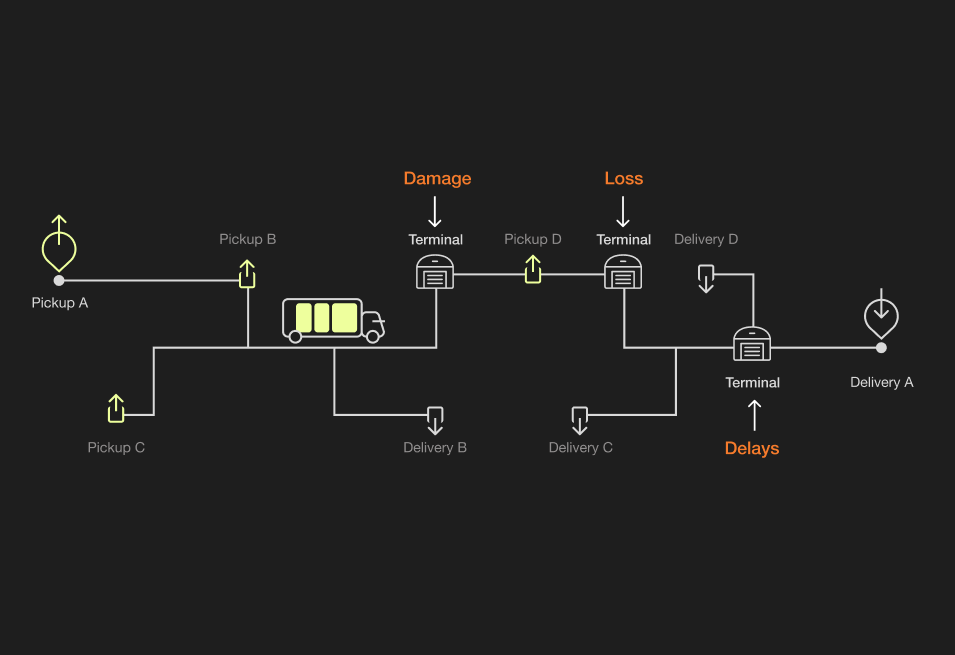LTL Consolidation: Will It Work for Your Company?

If you consistently ship freight that doesn’t fill a full truckload, you likely don’t want to pay for Full Truckload (FTL) shipping. In many cases, Less than Truckload (LTL) consolidation is a flexible option that can help you reduce costs, maximize trailer capacity, and reduce your company’s carbon footprint — if it makes sense for your business to use it. But how do you know if LTL consolidation is the right solution for your shipping needs? To help you decide, we’ll break down the situations in which LTL consolidation would be beneficial for you to use and some instances where it may not make the most sense.
What is LTL consolidation?
LTL freight shipping is commonly used when individual shipments are too small to require a dedicated truck (for example, shipments between 1-10 pallets or under 10,000 pounds). Since each shipment only occupies a portion of the truck’s capacity, the remaining space can be filled by other cargo heading in the same general direction. LTL consolidation is the process of combining multiple LTL shipments into a full truckload at the beginning of the shipping lane — helping you ship more efficiently and take advantage of lower shipping rates. LTL consolidation may mean gathering smaller shipments from various origins or suppliers within your company network, or it may mean coordinating your shipments with freight from other companies — and sharing the shipping costs. When planning for consolidated freight, you’ll consider factors like shipment sizes, transit times, and handling requirements. You may wonder how LTL consolidation differs from Partial Truckload (PTL) shipping, since both services offer an alternative for shipments that won’t fill an entire truck. The main difference is the size of the shipments. LTL shipping is suitable for smaller shipments that occupy less than half of a truck’s capacity. PTL shipping caters to larger shipments that are too big for LTL, but still won’t fill a trailer. In addition, pricing for LTL consolidation is typically based on weight, dimensions, density, and distance, while PTL pricing is often negotiated based on specific factors such as distance, equipment requirements, and specialized services.
Advantages of LTL consolidation.
LTL consolidation is perfect for smaller companies with smaller shipments. In 2022, nearly 45% of shippers shipped freight in partially empty trucks, resulting in reduced efficiency, higher transportation costs, and a negative impact on the environment.By combining small shipments, either to a cluster of your customers in the same area or with other companies shipping to the same area, you can increase efficiency in your business and in the transportation industry. In fact, LTL consolidation offers several advantages over traditional LTL shipping, such as:
More cost-effective
With some shipping methods, shippers need to pay for a full trailer, even if their product doesn’t fill up the entire space. However, with straightforward LTL consolidation, you’ll only pay for the trailer square footage you use. By creating a more optimized supply chain with LTL consolidation, your products will get to where they need to go in the most efficient and least costly way possible.
Reduced risk
Because LTL consolidation leads to fewer transfers and less unloading and reloading than other shipping methods, the risk of product damage is significantly lower. Fewer touchpoints make the process safer for your shipment — resulting in fewer claims and lower damage-related fees.
Better for the environment
Combining multiple LTL freight shipments into single full truckloads reduces the number of trucks on the road. That means your company can have a positive impact on the environment by lowering transportation-related emissions.
Simplified shipping
By consolidating smaller shipments, businesses can reduce administrative tasks and paperwork associated with individual shipments. Classification is also simplified as a consolidated shipment typically receives a single class rating based on standardized density and handling characteristics.
Challenges of LTL consolidation.
Although consolidated LTL is advantageous and may save you money in some situations, it isn’t always the best option. Sometimes, traditional hub and spoke LTL shipping might make more sense for your company. Let’s consider some common challenges associated with LTL consolidation:
Planning complexity
Shipping consolidation can take longer to plan and organize because you need to factor in things like pricing, timing, dimensions, and finding a reliable carrier to make sure that you are saving money and meeting your scheduling requirements.
Shipment compatibility
Ensuring compatibility between consolidated shipments can be challenging. Shipments may have varying sizes, shapes, fragilities, or special requirements, making it necessary to plan and arrange the loading in a way that minimizes risks and optimizes space utilization.
Longer transit times
Due to stops at distribution centers for sorting and re-routing, consolidated shipments may take longer to reach their destinations. If you’re not prepared for these delays, they could impact your customer service and satisfaction.
Equitable pricing
Negotiating pricing, handling charges, and other related costs while maintaining equity among participating parties can require careful negotiation and agreement.
LTL consolidation vs. traditional LTL
There are several factors that will determine whether or not LTL consolidation will be the right fit for your company, including your budget and how fast you need your shipment to get to its destination.The companies that will benefit most from consolidated LTL are those who have consistent shipments of partial loads. These companies will see significant savings by consolidating their shipments into single loads that fill the truck — especially those shipments that have rigid delivery schedules.Since LTL consolidation offers a safer option, it will be best for any shipments that contain high-value or fragile products. Less loading and offloading means these sensitive shipments will be less at risk for damage. Consolidated LTL offers quicker pickup times, is less expensive for companies with smaller shipments, and is much more efficient for those shipments that are going a shorter distance.Traditional hub and spoke LTL shipping may make more sense if you often send out small shipments on irregular schedules, if you’re less concerned about delivery deadlines, or if your freight doesn’t have any specific handling requirements.
Choosing the best freight service for your needs.
Your business deserves a cost-effective shipping solution that helps you provide the best possible service while reducing your environmental footprint — even with smaller shipments. Flock Freight offers all the benefits of LTL consolidation without the challenges. Our technology-driven, terminal-free shipping service, FlockDirect® will match your shipments with carriers in your lane, traveling on your schedule, and with shared truckload shipping, you’ll only pay for the space you use. Looking for a better way to move freight? See how our advanced technology and exceptional service can help you optimize your shipping processes and book the best mode for your load. Schedule a demo today.





